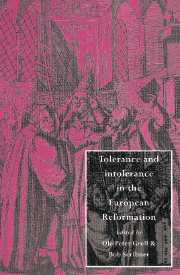Book contents
- Frontmatter
- Contents
- List of contributors
- Preface
- Dedication
- 1 Introduction
- 2 The travail of tolerance: containing chaos in early modern Europe
- 3 Preconditions of tolerance and intolerance in sixteenth-century Germany
- 4 Heresy executions in Reformation Europe, 1520–1565
- 5 Un roi, une loi, deux fois: parameters for the history of Catholic-Reformed co-existence in France, 1555–1685
- 6 Confession, conscience and honour: the limits of magisterial tolerance in sixteenth-century Strassburg
- 7 One Reformation or many? Protestant identities in the later Reformation in Germany
- 8 Toleration in the early Swiss Reformation: the art and politics of Niklaus Manuel of Berne
- 9 Tolerance and intolerance in sixteenth-century Basle
- 10 Exile and tolerance
- 11 The politics of toleration in the Free Netherlands, 1572–1620
- 12 Archbishop Cranmer: concord and tolerance in a changing Church
- 13 Toleration for Catholics in the Puritan revolution
- 14 The question of tolerance in Bohemia and Moravia in the age of the Reformation
- 15 Tolerance and intolerance in sixteenth-century Hungary
- 16 Protestant confessionalisation in the towns of Royal Prussia and the practice of religious toleration in Poland-Lithuania
- Index
2 - The travail of tolerance: containing chaos in early modern Europe
Published online by Cambridge University Press: 07 December 2009
- Frontmatter
- Contents
- List of contributors
- Preface
- Dedication
- 1 Introduction
- 2 The travail of tolerance: containing chaos in early modern Europe
- 3 Preconditions of tolerance and intolerance in sixteenth-century Germany
- 4 Heresy executions in Reformation Europe, 1520–1565
- 5 Un roi, une loi, deux fois: parameters for the history of Catholic-Reformed co-existence in France, 1555–1685
- 6 Confession, conscience and honour: the limits of magisterial tolerance in sixteenth-century Strassburg
- 7 One Reformation or many? Protestant identities in the later Reformation in Germany
- 8 Toleration in the early Swiss Reformation: the art and politics of Niklaus Manuel of Berne
- 9 Tolerance and intolerance in sixteenth-century Basle
- 10 Exile and tolerance
- 11 The politics of toleration in the Free Netherlands, 1572–1620
- 12 Archbishop Cranmer: concord and tolerance in a changing Church
- 13 Toleration for Catholics in the Puritan revolution
- 14 The question of tolerance in Bohemia and Moravia in the age of the Reformation
- 15 Tolerance and intolerance in sixteenth-century Hungary
- 16 Protestant confessionalisation in the towns of Royal Prussia and the practice of religious toleration in Poland-Lithuania
- Index
Summary
The natural habitat of intellectual history
The history of tolerance and toleration is one of the last preserves still firmly in the grasp of the intellectual historians. In their saga the sixteenth century plays a pivotal role, and in their ranks the Protestant Reformation was long the uncontested avant-garde, battling for individual liberty and public tolerance. When the Jesuit scholar Joseph Lecler published his impressive and widely hailed Histoire de la tolérance au siècle de la Réforme in 1955, the confession of some key players had changed but the perimeters of the intellectual playing field remained fixed. His saga has a new beginning and a fresh ending: the curve of progress is now traced from the scholastic debate about the rights of the erring conscience to the climate of toleration in Catholic Poland. Notwithstanding his awareness of the importance of political realities, Lecler concentrated on tracts and treatises, on publishers and printers. The ensuing critique of Lecler refocused on the creative triangle Basle–London–Amsterdam and turned with vigour to the new climate of scepticism emerging in the transition from the sixteenth century to the seventeenth. However, as in the case of Lecler and his predecessors, the debate continued to be a discourse in intellectual history.
In the English-speaking world, Henry Kamen raised his independent voice. Though granting that the Reformation brought greater religious liberty, he insisted that it did so ‘despite the reformers’ and merely ‘as a concomitant of free trade’. This intriguing observation evolves into a general thesis: in Protestant countries ‘toleration tended to increase in proportion to the decrease of dogmatic belief’.
- Type
- Chapter
- Information
- Tolerance and Intolerance in the European Reformation , pp. 13 - 31Publisher: Cambridge University PressPrint publication year: 1996
- 6
- Cited by



